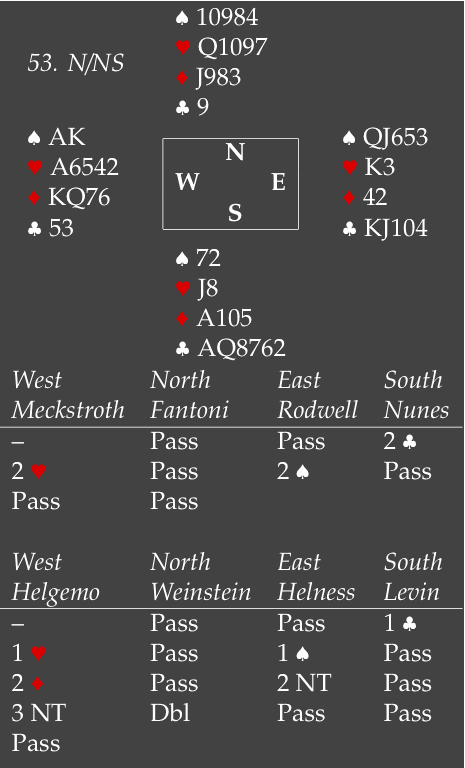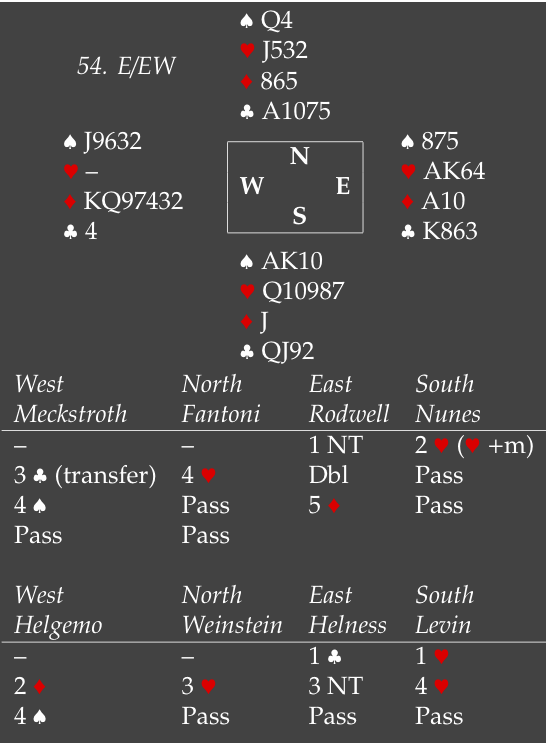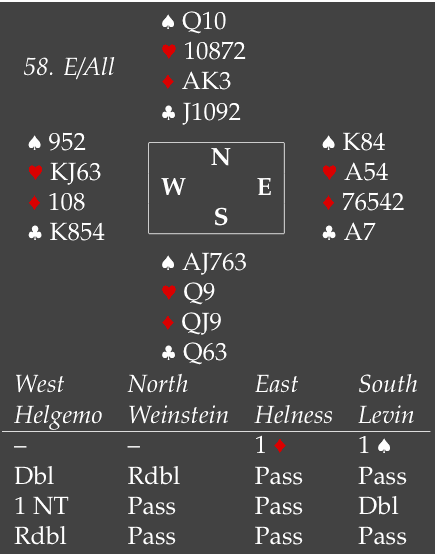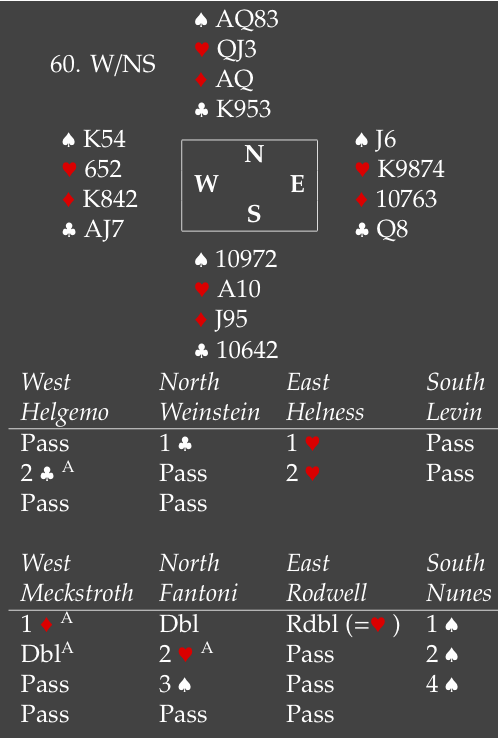 Yesterday was the first Sunday afternoon in a long time that met two requirements: decent weather (sunny and dry, some 20 to 25 degrees) and no other obligations. For us, this meant getting the bikes and making a long trip (65km) in the surrounding areas. Click here for information about the route we roughly took. Back home, time to sit down with a cold drink and the latest issue of bridge magazine IMP. I read Onno’s nice article about the US trials. The trials featured a number of matches where the Nickell team trailed at the halfway but nevertheless won. Onno said that no matter what, Nickell will any long knock-out match.
Yesterday was the first Sunday afternoon in a long time that met two requirements: decent weather (sunny and dry, some 20 to 25 degrees) and no other obligations. For us, this meant getting the bikes and making a long trip (65km) in the surrounding areas. Click here for information about the route we roughly took. Back home, time to sit down with a cold drink and the latest issue of bridge magazine IMP. I read Onno’s nice article about the US trials. The trials featured a number of matches where the Nickell team trailed at the halfway but nevertheless won. Onno said that no matter what, Nickell will any long knock-out match.
Later that evening, I logged in to Bridgebase.com. It was the closing night of the US Summer Nationals and the finals of the Spingold were being played. That match featured two of the strongest teams around at the moment: Nickell playing with the new line-up of Nickell-Katz, Meckwell and Levin-Weinstein and Monaco, playing with the same line-up that won the European Championships last month: Fantoni-Nunes, Helness-Helgemo and Zimmermann-Multon. Nickell was leading by 10 imp’s. If you believe what Onno wrote in IMP, time to log off. After all, Nickell will win, it was late on a Sunday evening and Monday is a working day again.
Fortunately, I didn’t log off, just watch what happened.
After 5 flat boards, this hand came up. First the closed room where Helness and Helgemo quickly bid to the routine 3NT. It wasn’t clear to the commentators what the double shows (“don’t lead clubs” or “lead dummy’s suit”) but either way, I don’t quite get it. With the north hand, you don’t know what to lead in order to defeat the contract, so one better passes and hopes that partner can figure it out. South led a heart and declarer had no problem scoring 9 tricks, for +550. That would have cost 4 imps. However, look at the auction in the closed room. South started off with a 2♣ opener, showing 10-13 and 4+ clubs. Then a wheel came off, it looks as if east intended 2♠ as forcing but west didn’t. The result, Meckwell in 2♠ with 26 high card points, a source of tricks and all suits well stopped. That’s something that hasn’t happened since the wheel was invented, they usually bid every game in sight and then some. 2♠ made with an overtrick, 9 imp to Monaco.
 The next board. Both Helness and Rodwell had their partner show something like a diamond-spade two suiter and had to pick a suit. Rodwell got it wrong. Helness guessed right but all that was at stake was an undertrick. Or was it?
The next board. Both Helness and Rodwell had their partner show something like a diamond-spade two suiter and had to pick a suit. Rodwell got it wrong. Helness guessed right but all that was at stake was an undertrick. Or was it?
Weinstein kicked off with a heart, won by the ace and declarer discarding his club loser. That meant that the contract was made. When later the ♠K and ♠Q dropped in a single trick, EW scored an overtrick. 13 imp’s to Monaco.
 Conventional wisdom has it that the game is easier for declarer than for the defenders. While they have to make less tricks, they cannot see each others hands and know exactly what partner has in mind. This hand proved that point when Monaco tried to make 1NT in both rooms. At table 1, the hand was boring, NS reached a quiet 1NT and took their obvious 8 tricks for a quiet +120.
Conventional wisdom has it that the game is easier for declarer than for the defenders. While they have to make less tricks, they cannot see each others hands and know exactly what partner has in mind. This hand proved that point when Monaco tried to make 1NT in both rooms. At table 1, the hand was boring, NS reached a quiet 1NT and took their obvious 8 tricks for a quiet +120.
More excitement occurred at table 2. Natural opening bid, overcall, negative double and a redouble showing a high spade honor. West obviously didn’t want to sit 1♠xx and tried 1NT, doubled by south for take-out, an SOS redouble, penalty pass by north and east decided that 1NTxx was the best spot after all. He was probably right about that, the alternatives aren’t great either. Now, all NS have to do to score +1000 is to take the same tricks as table 1. Note: a reader points out that Helness, at the table, commented that pass showed this hand-type and Helgemo had to take further action.
North led the ♠Q, ♠K and ducked by south. The ♠K is a good play, declarer knows that the suit will split 5-2. If north led from ♠QJ, the suit will now block, if he led from ♠Qx, it doesn’t matter and if he led from ♠Q10, south will have to guess who has the ♠10. With an entry-less hand, south made the not unreasonable play of a small spade, preserving communications if declarer had ♠10xx. Not right this time, but declarer still has only 6 tricks, -500. Next declarer played a diamond to north’s ♦K. A spade followed and south cashed 3 spade tricks, north discarding the ♣J and ♥8. South knew that his partner had trouble finding discards and decided to set up a club trick first, before cashing the last spade. Again, not quite right, declarer won the ♣A, took a heart finesse and had 7 tricks, 2 tricks more than in the other room, +760 meant 13 more imp’s to Monaco.
 And tinally this board. Levin and Weinstein were awfully quiet with the 23 high card points and spade fit, though it is hard to point out who should have acted at which point. 2♥ went down 2. In the closed room, Fantunes did a lot more bidding. Not unexpectedly, every high card was where it was supposed to be and 4♠ made on the spot. Another 11 imp’s to Monaco.
And tinally this board. Levin and Weinstein were awfully quiet with the 23 high card points and spade fit, though it is hard to point out who should have acted at which point. 2♥ went down 2. In the closed room, Fantunes did a lot more bidding. Not unexpectedly, every high card was where it was supposed to be and 4♠ made on the spot. Another 11 imp’s to Monaco.
Another 6 were added when Levin-Weinstein missed a marginal non-vulnerable game bid in the other room.
If you kept count, that is 52 imp’s to none on 5 boards. That is something that can happen to any team, even Nickell, but what was more surprising is their score on the remaining 11 boards in the set: zero, none, nada. 52-0, a complete shutout, something that is very rare in top level bridge. After all, the game is so complex, that it is almost impossible to score at least as well as your opponent on every board.
Obviously this was sufficient for Monaco to win the 2012 Spingold. Next month, both teams will be participating in the WMSG (formerly known as the Olympiad). That promises more fireworks, and as this tournament will be played in France, I won’t have to stay up until 3am to watch all the action.
